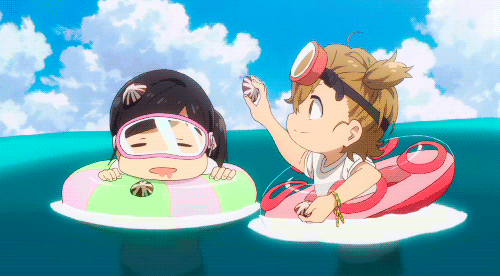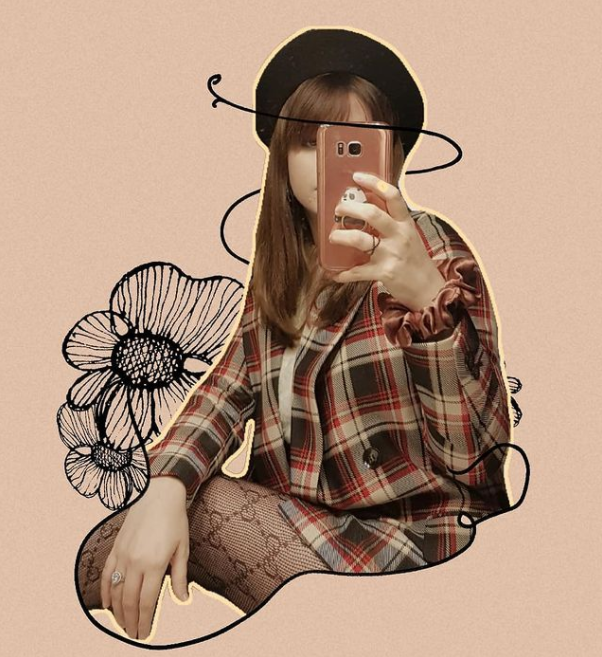Why is using sunscreen SO important? / ¿Por qué usar crema solar es TAN importante?
Our parents have been telling us to wear sunscreen since we were kids, always stopping us before running into the sea/pool, saying something like 'COME HERE, DON'T FORGET YOUR SUNSCREEN' and painting us white from head to toe (because our parents were so scared that we might get a bad sunburn so they used all the damn bottle on us. Ah, that sticky feeling, I still can feel it on my arms). Then, we have this rebelious era when we are teenagers (I proudly say I didn't have that era, since I always got sunburn on my nose and shoulders so I use sunscreen every 3 or 4 hours) in which we stop using sunscreen, or we use one with a low spf and then use a tanning oil, or we forget about the sunscreen and only use tanning oil. If we were going to get a tan, better if we get it quickly. When summer ends, we proudly show off our tan, we show how much we went to the beach or the pool, we show how amazing our summer was. But, does our skin feel the same as us? We are proud of the tan, but is our skin proud of that tan? We have to remember that our skin is the largest organ of our body, it defends us from a lot of bad things and we are using oil to fry it under the sun for hours.
Nuestros padres han estado diciéndonos que debemos usar crema solar desde que somos niños, siempre parándonos antes de correr hacia el mar/piscina, diciendo algo como "VEN AQUÍ, NO TE OLVIDES DE LA CREMA" y pintándonos de blanco de pies a cabeza (porque estaban tan asustados de que nos pillásemos una insolación que usaban todo el bote en nosotros. Ah, aquella sensación tan pegajosa, aún la noto en mis brazos). Después tenemos esta era rebelde cuando somos adolescentes (orgullosamente digo que no la he tenido, porque como siempre me quemo y pelo en la nariz y hombros, pues me ponía crema cada 3 o 4 horas) en la que dejamos de usar crema solar, o usamos una con un spf muy bajo y luego usamos aceite bronceados, o directamente nos olvidamos de la crema y nos untamos en aceite. Si íbamos a broncearnos, mejor si lo hacemos rápido. Cuando el verano acaba, orgullosamente enseñamos nuestro bronceado, enseñamos cuánto fuimos a tomar el sol y cómo de bueno fue nuestro verano. Pero, ¿siente nuestra piel lo mismo que nosotros? Estamos orgullosos del moreno, pero ¿está nuestra piel tan orgullosa como nosotros de ese moreno? Tenemos que recordar que nuestra piel es el órgano más grande de nuestro cuerpo, nos defiende de muchos agentes externos y estamos usando aceite para freírla bajo el sol por horas.
"We showed people what they looked like in ultraviolet, & wondered aloud if they wanted to put on some damn sunscreen already. "
"Le enseñamos a la gente cómo se ven con el ultravioleta, y nos preguntamos ('wondered aloud' es decir lo que piensas para ti mismo pero en voz alta, así los demás pueden escucharte) si iban a ponerse una maldita crema solar de una vez"
"Skin that damages easily, ages easily"
"La piel que se daña rápido, envejece rápido"
First, of all, are we sure what means a tan? It is not only when our skin gets darker in summer.
UVA & UVB
"The center of this confusion is the sun's ultraviolet A (long-wave) and ultraviolet B (shortwave) rays. Our understanding of exactly what kinds of damage each causes to the skin, and how best to protect ourselves, seems to shift every year as new research comes out. For example, it was once thought that only UVB was of concern, but we keep learning more and more about the damage caused by UVA. And new, improved forms of protection against UVA keep emerging. Keeping up with these new developments is a worthwhile challenge that can help all of us prevent sun damage.
UV radiation is part of the electromagnetic (light) spectrum that reaches the earth from the sun. It has wavelengths shorter than visible light, making it invisible to the naked eye. These wavelengths are classified as UVA, UVB, or UVC, with UVA the longest of the three.
Both UVA and UVB, however, penetrate the atmosphere and play an important role in conditions such as premature skin aging, eye damage (including cataracts), and skin cancers. They also suppress the immune system, reducing your ability to fight off these and other maladies.
By damaging the skin's cellular DNA, excessive UV radiation produces genetic mutations that can lead to skin cancer.
UVA, which penetrates the skin more deeply than UVB, has long been known to play a major part in skin aging and wrinkling (photoaging), but until recently scientists believed it did not cause significant damage in areas of the epidermis (outermost skin layer) where most skin cancers occur. Studies over the past two decades, however, show that UVA damages skin cells called keratinocytes in the basal layer of the epidermis, where most skin cancers occur.
UVA is the dominant tanning ray, and we now know that tanning, whether outdoors or in a salon, causes cumulative damage over time. A tan results from injury to the skin's DNA; the skin darkens in an imperfect attempt to prevent further DNA damage. These imperfections, or mutations, can lead to skin cancer.
Tanning booths primarily emit UVA. The high-pressure sunlamps used in tanning salons emit doses of UVA as much as 12 times that of the sun. Not surprisingly, people who use tanning salons are 2.5 times more likely to develop squamous cell carcinoma, and 1.5 times more likely to develop basal cell carcinoma. According to recent research, first exposure to tanning beds in youth increases melanoma risk by 75 percent.
UVB, the chief cause of skin reddening and sunburn, tends to damage the skin's more superficial epidermal layers. It plays a key role in the development of skin cancer and a contributory role in tanning and photoaging. Its intensity varies by season, location, and time of day. The most significant amount of UVB hits the U.S. between 10 AM and 4 PM from April to October. However, UVB rays can burn and damage your skin year-round, especially at high altitudes and on reflective surfaces such as snow or ice, which bounce back up to 80 percent of the rays so that they hit the skin twice.
Source: http://www.skincancer.org/prevention/uva-and-uvb
I highlighted the things that may interest you. To resume up, our tan is a self defense mechanism of our skin to prevent DNA damage.
I am not telling you to stop going to the beach, I am not going to stop. I am someone who was born in The Canary Islands, so that's impossible for me. Exposing our skin to the sun helps to synthesize Vitamin D, neccesary for our bones, body defenses and growth hormone. We just have to be careful with the sun, as much as we think he's our friend, if we don't take care of us he would be our enemy.
Antes de nada, ¿sabemos lo que es un bronceado?
(De traducir todo ese cacho, tendría que traducirlo entero, y la entrada quedaría demasiado larga (a parte de que es un gran cacho) así que os lo resumo y os invito a hacer click en los enlaces que dejo abajo)
Un bronceado es un mecanismo de defensa de nuestra piel, el cual se basa en producir melanina para bloquear los rayos UVB y UVA y así evitar daños es nuestro ADN, si nuestro ADN se daña, eso daría paso a mutaciones (suena a que nos va a salir un tentáculo de un costado, ¿verdad? Pero la realidad es peor, porque te puede salir cáncer de piel). UVA y UVB penetran la atmósfera y son los causantes del envejecimiento prematuro, daño ocular (cataratas incluidas) y cáncer de piel.También reprime a nuestro sistema inmunitario, lo que hace que no podamos combatir esos y otros problemas.
UVB es la causa de la rojez y la insolación, es el que daña más las capas superficiales de la dermis. Los rayos UVB pueden dañar tu piel en cualquier momento del año (no porque haga frío nos vamos a salvar, las radiaciones no entienden de estaciones)
Con esto no os digo que dejéis de ir a tomar el sol, yo no voy a dejar de hacerlo. Nací en las Islas Canarias, así que eso es imposible para mi. Exponer nuestra piel al sol ayuda a sintetizar la Vitamina D, necesaria para nuestros huesos, nuestras defensas y para la hormona del crecimiento. Sólo tenemos que tener cuidado con el sol, por mucho que pensemos que es nuestro amigo... si no nos cuidamos, sería nuestro enemigo.
(Y dicho esto, decir también que mejor olvidarse de los bronceados artificiales, esos de cabina)
Sunscreen for face / crema solar para la cara:
1) A'PIEU Pure block natural daily sun cream SPF45
($9.58 at Jolse.com)
A Creamy texture with fresh water retention that is not sticky , powerful resistance to UV damage to the skin.
Silky skin keeps for a long time.
Contains natural aloe vera extract for calming skin, non stickiness and non oiliness
with immediate absorption. Daily sun cream that helps refreshing all day.
This versatile sun cream protects the skin from both UVA and UVB and works as a mattifying and pore smoothing primer.
Formulated with extracts of sebum absorbing Cotton Seed and Chia Seed, which is known to carry up to 10 times its weight in moisture,
it hydrates and absorbs excess shine at the same time.
1. Pure Green Baby - soft skin care for baby.
2. Minimized skin irritation thanks to jeju green tea.
3. ECOCERT Certified organic skin care.
4. 99.9% natural mineral UV ray filter.
5. Free of animal ingredient, paraben, benzophenone, perfume, mineral oil, silicon oil.
6. Keep babys' skin from UV rays.
4) Dermatologist Solutions™ Super Fluid UV Mineral Defense Broad Spectrum SPF 50+
($38 at Kiehl's)
100% Mineral-based sunscreen, safe enough for sensitive and acne prone skin.
5) Institut Esthederm Moderate facial sun cream
(Price? - at Esthederm)
More information about Sun damage, skin cancer and related:
http://www.cancer.org/cancer/cancercauses/sunanduvexposure/skincancerpreventionandearlydetection/skin-cancer-prevention-and-early-detection-what-is-u-v-radiation
http://uv.biospherical.com/student/page4.html
Más información sobre el daño solar, cáncer de piel y relacionado:
http://kidshealth.org/es/teens/tanning-esp.html
http://www.elblogdelasalud.es/bronceado-por-que-nos-ponemos-morenos/
Now you know why sunscreen is important for our skin, remember to use it during all the year, not only when you're going to the beach (our skin is still exposed to UVB and UVA!)
Ahora sabes por qué la crema solar es tan importante, recuerda usarla todo el año, no sólo cuando vas a la playa (¡nuestra piel sigue siendo expuesta a los rayos UVB y UVA!)
Now you know why sunscreen is important for our skin, remember to use it during all the year, not only when you're going to the beach (our skin is still exposed to UVB and UVA!)
Ahora sabes por qué la crema solar es tan importante, recuerda usarla todo el año, no sólo cuando vas a la playa (¡nuestra piel sigue siendo expuesta a los rayos UVB y UVA!)













0 comentarios